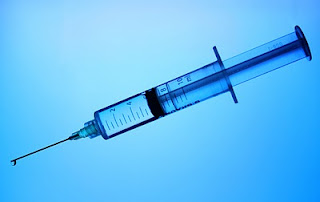Tuesday, January 19, 2010
Cocaine Vaccine Hits Snag
Some addicts risk OD to overcome its effects.
The National Institute on Drug Abuse (NIDA) has increasingly placed its bets on treating cocaine addiction with a vaccine rather than an anti-craving medication. And there is reason for this: No prominent candidates for anti-craving drug treatments have yet emerged from the research on cocaine and methamphetamine addiction.
However, there’s a catch: Some cocaine addicts appear willing to risk overdose in order to defeat a new cocaine vaccine, a recent study has shown.
The study, which appeared in the Archives of General Psychiatry, demonstrated that the TA-CD vaccine could blunt the effects of cocaine in some, but not all, patients. The vaccine works by causing the production of antibodies, which attach themselves to cocaine molecules, making the molecules too big too pass effectively through the blood-brain barrier.
Of 115 addicts involved in the study, only 38 % produced sufficient antibodies to dull the effects of cocaine, Rachel Saslow of the Washington Post reported. And among the high-antibodies group, only 53 % stayed free of cocaine 50 % of the time. “Immunization did not achieve complete abstinence from cocaine use,” said Thomas Kosten of Baylor college of Medicine, one of the authors of the paper.
Moreover, in some of the study participants for whom antibodies made cocaine a disappointing high, researchers found cocaine levels in the body to be as much as ten times higher than previous levels of usage—an obvious attempt to overcome the vaccine’s effectiveness. There were no overdoses, according to Kosten.
No researcher has claimed this as a complete breakthrough, in light of the fact that even those who responded well in the high-antibody group achieved a substantial reduction in cocaine use during the study period--but not abstinence. At this stage the work appears to be aimed more at dose reduction.
Despite the mixed results, NIDA director Nora Volkow characterized the work as “a promising step toward an effective medical treatment for cocaine addiction,” with the proviso that “larger follow-up studies confirm its safety and efficacy.” In an earlier interview with Addiction Inbox, Volkow also expressed excitement about another possible addiction vaccine: “Currently there are anti-nicotine vaccines in clinical testing, which are designed to capture the nicotine molecules while still in the bloodstream, thus blocking their entry in to the brain and inhibiting their behavioral effects. They appear to be effective in helping subjects who develop a high antibody response sustain abstinence over long periods of time. Even those people with a less robust antibody response to the vaccine, decreased their tobacco use. So this approach appears very promising.”
An earlier study by Margaret Haney and others at Columbian University Medical Center, published in Biological Psychiatry, had similar results: “The TA-CD vaccine substantially decreased smoked cocaine's intoxicating effects in those generating sufficient antibody.”
In both studies, roughly a quarter of participants made almost no antibodies at all in response to a vaccine injection.
A multi-site clinical trial of the vaccine, headed up by Kosten at Baylor, will begin sometime this spring.
Haney of Columbia told the Washington Post that people “have a mistaken view of how a vaccine might work, thinking of it as magic, where what it’s doing, at best, is blunting the effects. They get very excited, and it’s heartbreaking.” An earlier Addiction Inbox post on cocaine vaccination brought several emails from people asking where they could obtain the vaccine.
DrugMonkey at scienceblogs.com dissected the complicated study, particularly the different levels of antibodies generated in study participants, calling the vaccine “quite obviously not a silver bullet at present.” Furthermore: “Even for the high-responders the outcome was far from overwhelming, a 10 percentage improvement from 35% to 45% cocaine-free urines.”
Given how intractable to treatment addiction to stimulants has proven, any promising results at all are cause for cautious optimism. DrugMonkey writes: “We need new approaches and this immunopharmacotherapy stuff has potential.”
Subscribe to:
Post Comments (Atom)

3 comments:
thanks for the post. I was just reading about this the other day.
Amazing that people would try to beat the test. What is the purpose of that?
If you are strongly addicted to cocaine, your purpose is to get high, whatever it takes.
I would donate to this cause. I was worried that the government wouldn't allow such a vaccine because It could put a damper to alot of problems such as Robberies, Murders, Assault, Trafficing, Drug dealing, Child Abuse, and of course thats alot of employment..But I hope the studies continue and pray that they are a success even for a small percentage Being or living with an addict is a living hell.
Post a Comment